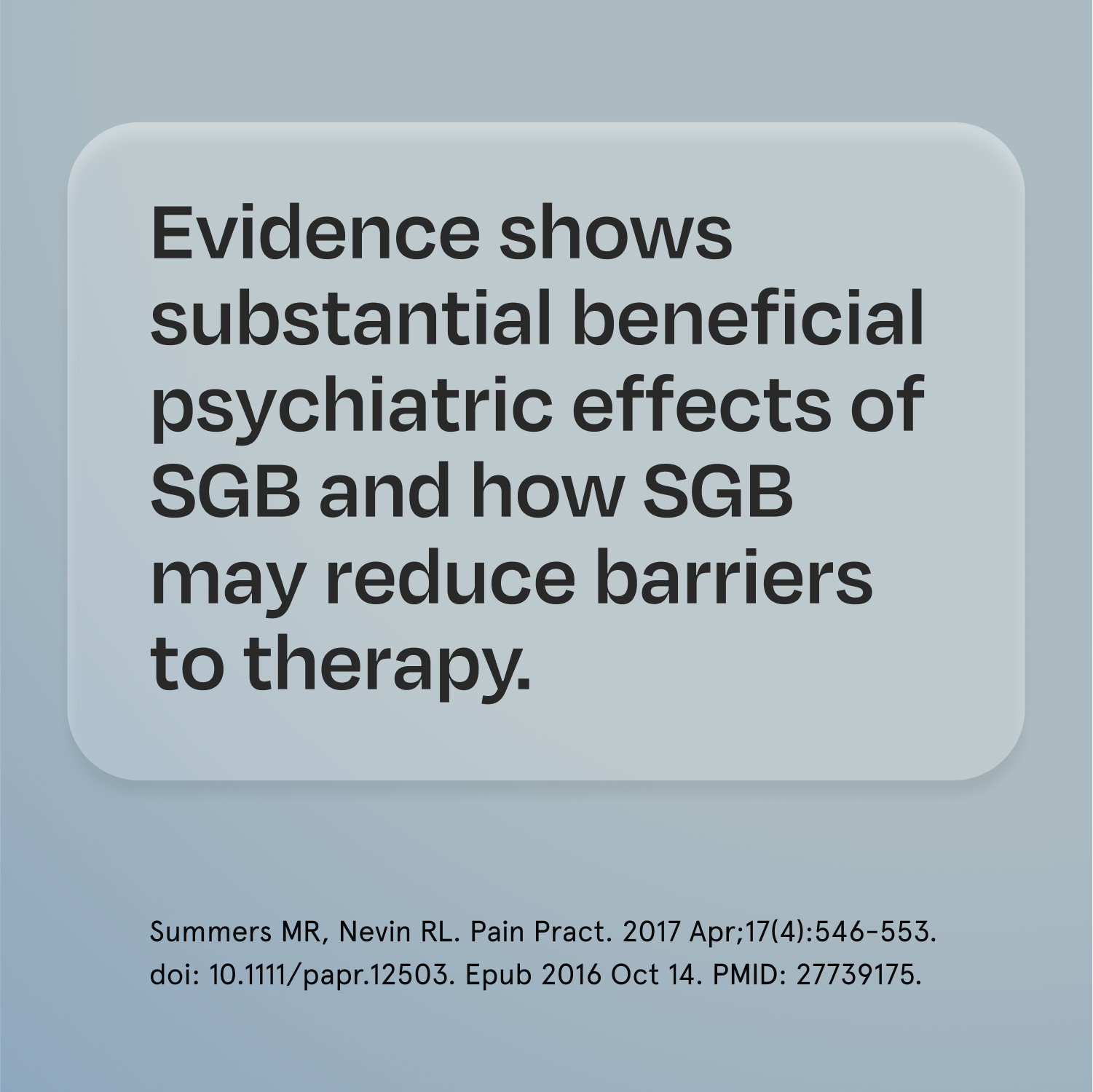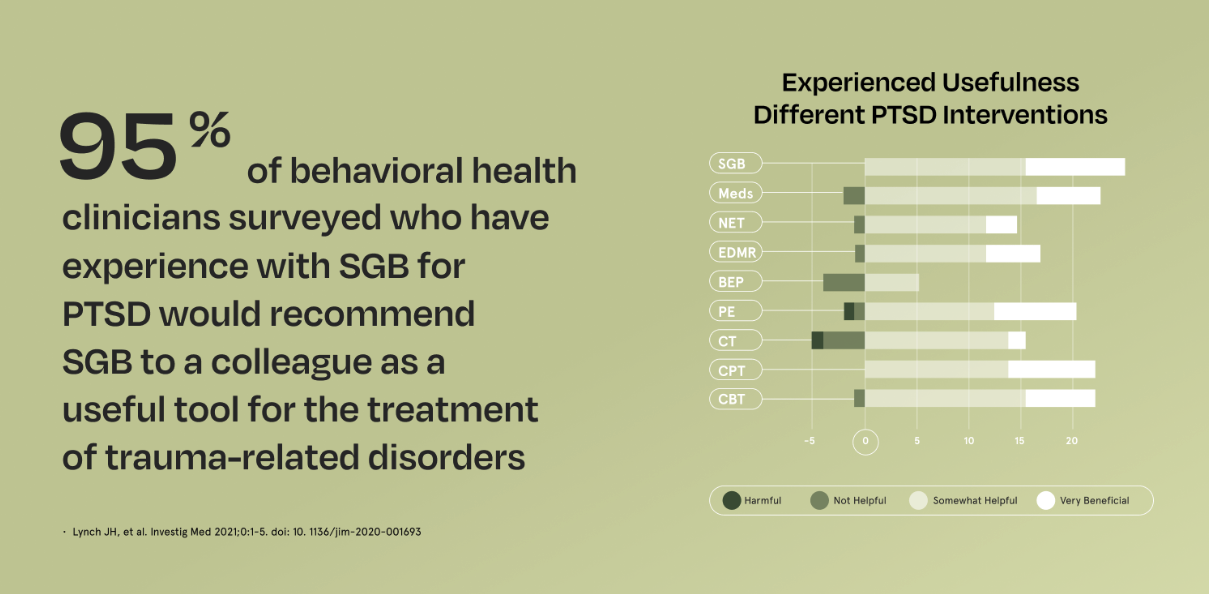Biological Interventions for Mental Health Care

If you think that you may be experiencing symptoms, take this PTSD test online or speak to a Care Advocate now directly by calling (908) 293-7559.
Landscape of Care
Many interventions developed and improved over the last century have shown promising results in alleviating symptoms of PTSD, anxiety, and depression. Let's discuss a few:
Lifestyle changes and mindfulness practices
The increasing awareness of mindfulness practices has played an important part in mental health treatment over the last half-century. According to Mindful.org, "a total of 16,581 journal articles were published in Web of Science, a database of peer-reviewed, scholarly journals,"– from one mindfulness article published in 1966 to almost 3,000 published in 2020. From deep breathing exercises to meditation, even with the assistance of a phone app, these meditation modalities have become common practice.
Mindfulness practices can help individuals with emotional trauma and mental health challenges learn to be present in the moment and manage difficult emotions. These practices can play a big role in alleviating overwhelming distress by grounding us within our space and time so the threat we've faced is not a real threat but a memory.
Making positive lifestyle changes, such as getting regular exercise, practicing good sleep hygiene, and eating a healthy diet, can improve mental health and well-being. In addition, there are multiple ways to gain clarity and navigate intense emotions.
Journaling allows us to open up with our emotions in a space we usually don't have access to, helping us become more positive and aware of our surroundings. It can be a powerful device for self-analysis and processing emotions in a healthy way.
Similar to journaling, art therapy has been connected to reduced stress and improved mood. For some, it's an essential tool for self-reflection and introspection, giving us a canvas to express our emotions in a judgment-free zone.
Body scan meditation
Checking in with our physical selves is a much-needed mindfulness practice. The symptoms we experience, like anxiety, stress, and PTSD, don't just manifest psychologically but affect our bodies as well. A complete body scan meditation can help you reconnect with your physical self and promote awareness of stresses, anxieties, etc.
Pharmaceutical Interventions
Medications such as antidepressants, anti-anxiety medications, stimulants, and mood stabilizers can help manage symptoms of mental health conditions and emotional trauma. However, these medications often work on the effects of the challenge rather than addressing the root cause, and they may not be effective for everyone.
Psychological interventions
Whether in an early stage of a mental health challenge or late stage, many psychological interventions like cognitive-behavioral therapy (CBT), eye movement desensitization and reprocessing (EMDR), and group therapy can help reduce symptoms and enhance our healing processes.
Talk therapy involves talking with a trained therapist to explore thoughts, feelings, and behaviors related to a set of challenges. This can help individuals to gain insight into their symptoms and develop coping strategies.
While solution-focused therapy focuses on changing negative thought patterns and behaviors that increase and prolong suffering, EMDR involves recalling a traumatic event while simultaneously focusing on an external stimulus (such as a moving finger or light) that is meant to stimulate the brain's natural healing process.
Other approaches, like group therapy, provide a supportive environment for individuals with emotional trauma and mental health challenges to share their experiences, connect with others, and learn coping strategies.
Another form of therapy, called psychoeducation, aims to educate patients about their mental health challenges and provide them with the knowledge and skills they need to manage their symptoms effectively and help people overcome their challenges and heal permanently.
There is no doubt that these interventions have helped millions of people worldwide each year, individually and in tandem with one another. But unfortunately, each one of these interventions takes time and dedication and not all address the root cause of the challenge or trauma.
Biological Interventions
In the last two decades, the mental health community and medical providers have taken great strides in combating mental health challenges and emotional trauma. Awareness has grown, accessibility has expanded, and more and more case studies are being published. Two of the most significant breakthroughs in the last two decades come in the form of biological interventions, the dual sympathetic reset, an advanced stellate ganglion block, and ketamine infusions.
Innovative biological interventions, such as the dual sympathetic reset and ketamine infusions, are fast and effective. Many patients feel relief within minutes or hours of these treatments. Combining biological and psychological modalities may help patients get the best possible treatment outcomes.
Dual Sympathetic Reset
The Dual Sympathetic Reset, an advanced adaptation of the Stellate Ganglion Block (SGB), features two injections of local anesthetic on the same side of the neck next to a bundle of fight-or-flight nerves. A successful DSR helps restore normal biological function and has the potential to relieve even the most severe symptoms of trauma. This can restore healthy nerve pathways, thereby returning the body to its pre-trauma state.
Ketamine Infusions
Ketamine has been around since the 1960s, but only in recent decades has it been fully utilized in the treatment of PTSD, depression, and anxiety.
Ketamine is an NMDA receptor antagonist that interacts selectively with key brain neurotransmitters. By increasing the levels of glutamate in the brain, ketamine can help to improve mood and reduce feelings of depression.
A study published in 2019 suggests that administering slow intravenous ketamine to patients with severe depression can significantly improve depression and anxiety symptoms immediately after a single dose. Repeated doses over two weeks show an overall decrease in illness severity after two weeks. Despite some limitations, the study contributes to the growing literature on the clinical impact of ketamine in patients with severe depression.
Stella's Symptom Quiz is a brief assessment that measures symptoms related to post-traumatic stress, depression, anxiety, and stress. By taking this quiz, you can get an understanding of your symptoms and see if you may be a good fit for Treatment by Stella, take the quiz here.
How is Stella's approach different?
Individualized Trauma-Informed Care
PTSD, anxiety and depression are complicated, multi-faceted challenges that require an individualized approach and the potential use of multiple treatment modalities.
First, they are complex challenges that can manifest differently, and their underlying causes can vary between individuals. That is why many mental health treatment organizations, like Stella, take a trauma-informed, individualized approach. Medical doctors who use a trauma-informed care approach understand and acknowledge the profound impact of trauma and its symptoms on an individual's life. Instead of asking for a person's trauma story, they focus on providing trauma-specific treatment approaches and recognize that the road to recovery is unique, personal, and often complex. This collaborative approach to healing helps ensure that each person's needs are met with sensitivity and respect. Often times trauma makes us feel powerless, so it's important for treatment providers to empower patients through a respectful, collaborative approach to care.
There is no one-size-fits-all approach to treating emotional trauma and mental health challenges. What may work for one person may not work for another.
Secondly, The effectiveness of a particular modality may depend on various factors, such as the severity and duration of symptoms, the individual's age and overall health, and their support network.
Lastly, some individuals may have difficulty accessing or engaging in treatment due to stigma, lack of resources, or other barriers.
Stella's Advanced Practice Providers are experienced, trauma-informed, and well-versed in the most innovative treatments. They'll take the time to get to know you and understand your symptoms and recommend a plan of care that is holistic and includes referrals for support and services - including treatments outside of Stella - to address your individual needs. We will do our best to get you the outcome you deserve.
Responsible Innovation
Stella is widely reputed for its commitment to responsible innovation, which means innovation that prioritizes our patient's safety while maximizing their chances of a great outcome. In our use of ketamine as a treatment modality, this principle directly translates into our cutting-edge protocol. Specifically, all of our ketamine treatments are offered onsite, where our patients are actively monitored during their infusion treatments. We also recommend working with Stella-certified therapists, like the trauma-informed team at All Points North.
Stella Certified MDs are all trained on Stella's medical protocols and can answer the questions you may have about these innovative treatments that others may not be able to provide.
The most effective treatments often involve a strategic fusion of biological, psychological, and peer support interventions.
Stella's biological approach to treating emotional trauma and mental health challenges like anxiety, depression, and PTSD focuses on addressing the underlying physical and chemical imbalances in the brain that can contribute to these conditions. Stella uses evidence-based practices and the latest research to guide treatment decisions. For example, in a survey conducted by Stella's Chief Medical Officer, Dr. Eugene Lipov, within a total of 1,353 number of patients who had been diagnosed with PTSD and responded to the survey, 69% percent reported that "renaming the condition to post-traumatic stress injury (PTSI) would decrease the stigma associated with this condition," which in return would help those experiencing symptoms of the condition seek help when needed.
Stella has long viewed trauma as a biological injury, and research like this, within a large sample of trauma sufferers, confirms and validates Stella's progressive approach.
Stella's white paper, authored by Stella's Chief Psychologist and nationally renowned trauma expert Dr. Shauna Springer, advances a new model of care that fuses Stella's innovative biological approaches with talk therapy and other traditional modalities of care. Dr. Springer said the dual sympathetic reset "opens up a window of opportunity for people to benefit from treatment without the barrier of fighting through symptoms like difficulties concentrating and overwhelming surges of anxiety. When calm is restored in the body, patients can be fully present in therapy." With a calm state of mind, patients can actively participate in talk therapy, ketamine treatment, gain fresh perspectives, and acquire new ways of addressing their challenges. They can better focus on altering destructive behavior patterns related to chronic stress or trauma.

Stella encourages a continued psychological approach after the dual sympathetic reset and or ketamine treatments. Together, they help to achieve the best possible outcome and stay at the forefront of interventions for emotional trauma and mental health challenges. Advancements in research and technology continue to improve our understanding of treatments for these debilitating symptoms. From medicines to virtual healing to holistic approaches, the future of interventions looks promising.

Why This Matters
Multimodality approaches can lead to better outcomes and biological interventions have shown great promise. A recent patient survey conducted by Stella discovered that a large portion of those looking for help with symptoms have tried other modalities before seeking Treatment by Stella.
- 79% have tried prescription medication
- 58% have tried cognitive behavioral therapy
- 40% have tried eye movement desensitization and reprocessing
- 22% have tried psychiatric intensive outpatient or partial hospitalization programs
- 19% have tried wellness retreats
Treatment by Stella has offered fast, effective relief for thousands of people worldwide and continues to stay on the forefront of treatment innovation. Along with the combination of other modalities, Stella and its biological interventions can intercept symptoms of emotional trauma and mental health challenges and shepherd the best possible treatment outcome.
Discover how Stella's biological interventions have helped those looking for relief here.